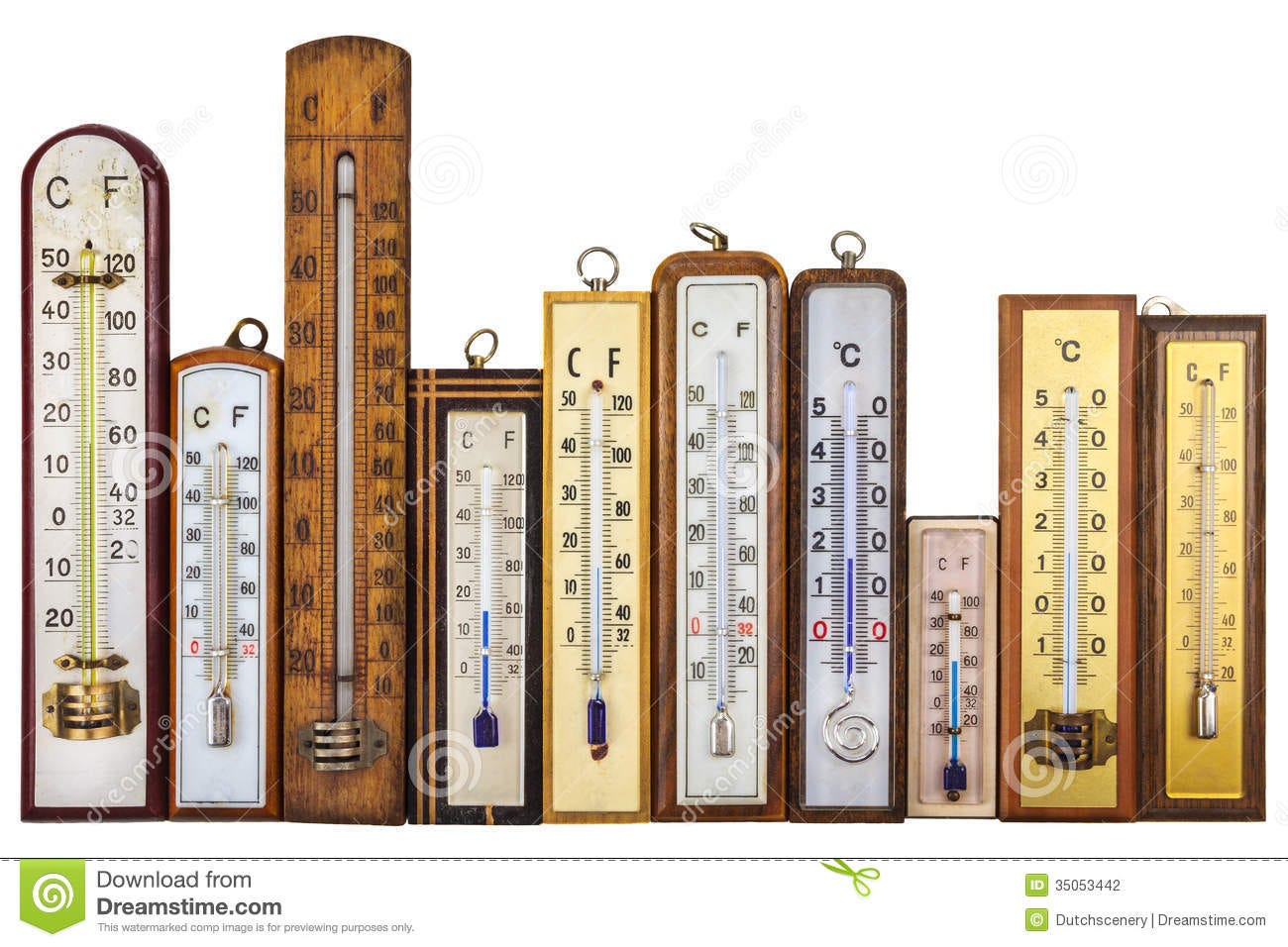Can you trust the temperature data?
“Global Temperature” is a theoretical construct, not a fact in reality. However, it is used by “Climate Scientists” to predict it well into the future using computer models and past data.
Proxies and Thermometers.
A variety of old thermometers are shown. Their designs are all different and the materials used to make them varied too.
I doubt that I would get exactly the same reading if I used each of them to measure the outside temperature in my yard. They were not calibrated with each other or against a universal standard. My guess is that these instruments were in use in the mid twentieth century and would be considered accurate to within 1 or 2 degrees Celsius.
A fair and meaningful representation of Global Temperature may be reasonably calculated under the following conditions:
Divide the world into temperature measurement zones of 1 square kilometre each. Climate can change from one zone to the next (for example, it could be raining in one zone and sunny in an adjacent one.) Data collected in every individual zone across the planet would provide a reasonable level of granularity to consider the temperature measurements to be representative of conditions within each zone.
Install the identical model of thermometer in every zone and ensure that they are calibrated to within 0.01 % accuracy with each other.
Take the daily temperature at exactly the sun’s high point each day. If the sun is directly over the thermometer when the data is collected, then this will standardize the time of day for every measure across all dataset.
Account to variations in thermometer elevation, weather/environmental conditions (sun/cloudy/raining/snowing), barometric pressures, zone wind speeds, location proximity to nature (versus an asphalt parking lot in a major city) and other variables that may affect temperature measurements such as Milankovitch cycles.
Aggregate the temperature measurements from all these measurement zones across the planet. Report the results daily. Provide a precise description of the standards used to collect the datasets and provide a thorough explanation of the many factors that can affect these measurements.
Note 1. Climate Change alarmists want to prevent a rise in Global Temperatures of 1.5 degrees Celsius over the next 80 years. Now consider that the temperature datasets used by computer modellers that go back over 150 years using temperature instruments that evolved dramatically over those years. Some of those datasets were likely collected using thermometers like those pictured. Modern thermometers available since 2000 are likely pretty good. For extrapolating and projecting future Global Temperatures, the modellers must make many assumptions about future temperature measurements and Global Temperature expectations. Unless they have an accurate crystal ball or a time travel machine, their assumptions are little more and an educated guess.
Note 2. How many temperature measurement locations reported regularly in 1923 across America? This is unknown but it is unlikely to be over 100 and their locations across the country were likely near centres of high population. This means that vast areas of North America would not have been represented in the datasets used by today’s Climate Science modellers. In other words, the farther back in time we do, the less reliable the temperature datasets become. Proxy temperature measurements are often used to guesstimate distant past temperature conditions. For example, ice core samples are commonly used for such calculations. I wonder how they may be used to guesstimate global temperature estimate given that places like Mexico are not known for their ice core sampling.
Note 3. There are seven continents on Earth and about 2/3 of the planet is covered in water. Can anyone explain to me how the datasets collected over the past 150 years can be an accurate representation of Earth’s Global Temperature over that time period?
As you consider the above, you can begin to understand why people like me are skeptical of “The Science” claimed by the IPCC and Climate Change Alarmists.





I agree the science is far from settled. It is rarely settled. And I would point out that scientists have used temperature estimates that do not depend on thermometers; Ice cores and tree rings can provide average temperatures for a season or a year.
And you are correct about computer simulations,, especially ones that try to predict the future based on data from the past.
I would be more inclined to blame the MSM and Government for the claims about Global Warming (AKA "climate change"}. It's a way for the government to get more voters to accept more regulations and government spending. I haven't read the IPCC report, but some who have claim isn't as scary as the MSM makes it out to be.